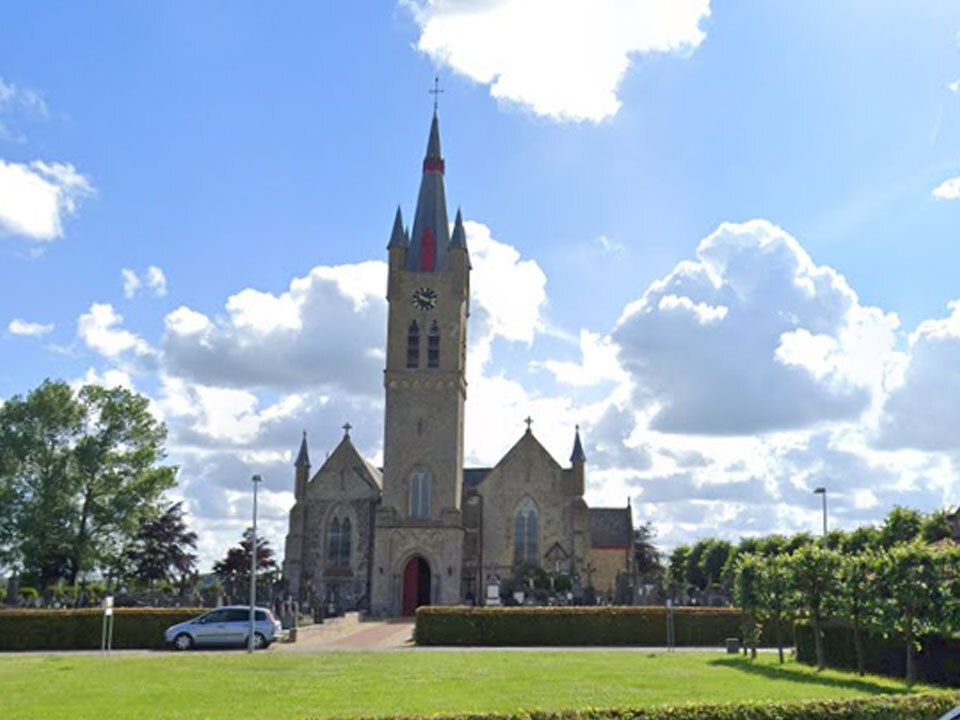Sint-Jans Onthoofdingkerk
Stavele
De Sint-Jans Onthoofdingkerk is de parochiekerk van de tot de West-Vlaamse gemeente Alveringem behorende plaats Stavele, gelegen aan het Alexis Decarneplein.

Geschiedenis
De parochie bestond reeds in 1155. Een omstreeks 1250 gebouwd romaans kerkje werd vervangen door een laatgotisch kerkgebouw, dat in 1796 -door Fransgezinde revolutionairen- in brand gestoken en geplunderd werd om hersteld te worden in 1800. In 1830 werd de kerk herbouwd. In 1889 werd het gebouw vergroot in neogotische trant, naar ontwerp van Antonius Verbeke. Er werd toen een westtoren, een transept, een doopkapel en een oostpartij aangebouwd.
Tijdens de Eerste Wereldoorlog werd de toren door de geallieerden als uitkijkpost gebruikt. In 1917 sneuvelde de Franse soldaat Etienne Lorin te Bikschote. Hij werd aanvankelijk op het kerkhof van Stavele begraven. Zijn ouders, die glazenier waren, schonken in 1919 twee glas-in-loodramen aan de kerk. Naast religieuze voorstellingen -Doop van Christus, marteldood van Sint-Stefanus (Saint-Étienne)- zijn daarop ook scènes uit de Eerste Wereldoorlog te zien, evenals het portret van Etienne Lorin.
Gebouw
Het betreft een driebeukige hallenkerk met voorgebouwde, zware westtoren, welke drie geledingen telt. De toren is voorzien van hoektorentjes op de torentrans.
Interieur
Het kerkmeubilair is grotendeels neogotisch (eind 19e eeuw). Er is een 17e-eeuws eiken Hubertusbeeld en een Onze-Lieve-Vrouw van Smarten in gepolychromeerd hout uit de eerste helft van de 18e eeuw.
Het orgel uit 1821-1822 is van de orgelbouwers Van Peteghem.
L'église Saint-Jean-Baptiste
Stavele
L'église Saint-Jean-Baptiste est l'église paroissiale de la ville de Stavele appartenant à la commune flamande occidentale d'Alveringem, située sur la place Alexis Decarneplein.
L'église Saint-Jean-Baptiste est l'église paroissiale de la ville de Stavele appartenant à la commune flamande occidentale d'Alveringem.

L'histoire
La paroisse existait déjà en 1155. Une petite église romane construite vers 1250 fut remplacée par un édifice gothique tardif, qui fut incendié -par les révolutionnaires français- et pillé en 1796, pour être restauré en 1800. En 1830, l'église a été reconstruite. En 1889, l'édifice a été agrandi dans un style néogothique, conçu par Antonius Verbeke. Une tour ouest, un transept, un baptistère et une aile est sont alors ajoutés.
Pendant la Première Guerre mondiale, la tour fut utilisée par les Alliés comme poste d'observation. En 1917, le soldat français Etienne Lorin est mort à Bikschote. Il a d'abord été enterré au cimetière de Stavele. Ses parents, qui étaient vitriers, ont fait don de deux vitraux à l'église en 1919. Outre des scènes religieuses - baptême du Christ, martyre de Saint-Étienne - ils représentent des scènes de la Première Guerre mondiale, ainsi que le portrait d'Étienne Lorin.
L'édifice
Il s'agit d'une église-halle à trois nefs avec une lourde tour occidentale à trois nefs. Le clocher est surmonté de tourelles d'angle.
Intérieur
Le mobilier de l'église est en grande partie néo-gothique (fin du 19e siècle). Il y a une statue d'Hubertus en chêne du XVIIe siècle et une Notre-Dame des Douleurs en bois polychrome de la première moitié du XVIIIe siècle.
L'orgue de 1821-1822 est l'œuvre du facteur d'orgues Van Peteghem.
Church of St John the Baptist
Stavele
The Church of St John the Baptist is the parish church of the town of Stavele belonging to the West Flemish municipality of Alveringem, located on Alexis Decarneplein.

History
The parish existed as early as 1155. A small Romanesque church built around 1250 was replaced by a late Gothic church building, which was set on fire -by French revolutionaries- and looted in 1796, to be restored in 1800. In 1830, the church was rebuilt. In 1889, the building was enlarged in neo-Gothic style, designed by Antonius Verbeke. A west tower, a transept, a baptistery and an east wing were then added.
During World War I, the tower was used by the Allies as an observation post. In 1917, the French soldier Etienne Lorin died in Bikschote. He was initially buried in Stavele cemetery. His parents, who were glaziers, donated two stained-glass windows to the church in 1919. Besides religious scenes - Baptism of Christ, martyrdom of Saint Stephen (Saint-Étienne)- they also show scenes from World War I, as well as Etienne Lorin's portrait.
Building
This is a three-nave hall church with a heavy west tower, which has three naves. The tower has corner turrets on the spire.
Interior
The church furniture is largely neo-Gothic (late 19th century). There is a 17th-century oak Hubertus statue and a Our Lady of Sorrows in polychromed wood from the first half of the 18th century.
The organ from 1821-1822 is by the organ builders Van Peteghem.